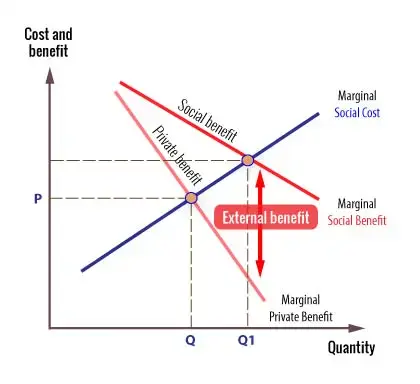
External benefit
External benefit – definition
An external benefit is the benefit gained by an individual or firm as a result of an economic transaction but where they are not directly involved in the transaction. External beneficiaries are collectively called ‘third parties’. External benefits can arise from both production and consumption.
Many, if not most transactions create external benefits – examples include:
- Taking a bus reduces congestion on a road, enabling other road users to travel more quickly.
- Buying a burglar alarm may deter possible burglars from a street or an area, which provides a benefit to other home owners.
- Making any purchase that results in paying indirect tax may provide benefits as a result of the increased public spending that may arise. The same purchases generate income to firms (which is a private benefit) but those firms may spend some of their income on staff training -the benefits of this training may be transferred to other firms if the employee leaves and moves to a new firm.
- The building of a new block of apartments may require the developer to build access roads to the new block. These roads can be used by residents of other buildings.
External beneficiaries can be seen as ‘free-riders’ given that they derive a benefit but do not pay for the benefit they derive. Where the goods are ‘merit goods’, such as education, governments may provide subsidies to encourage consumption so that the benefits may be widely gained by more than just those can afford to pay.
Diagram to show an external benefit from consumption:



